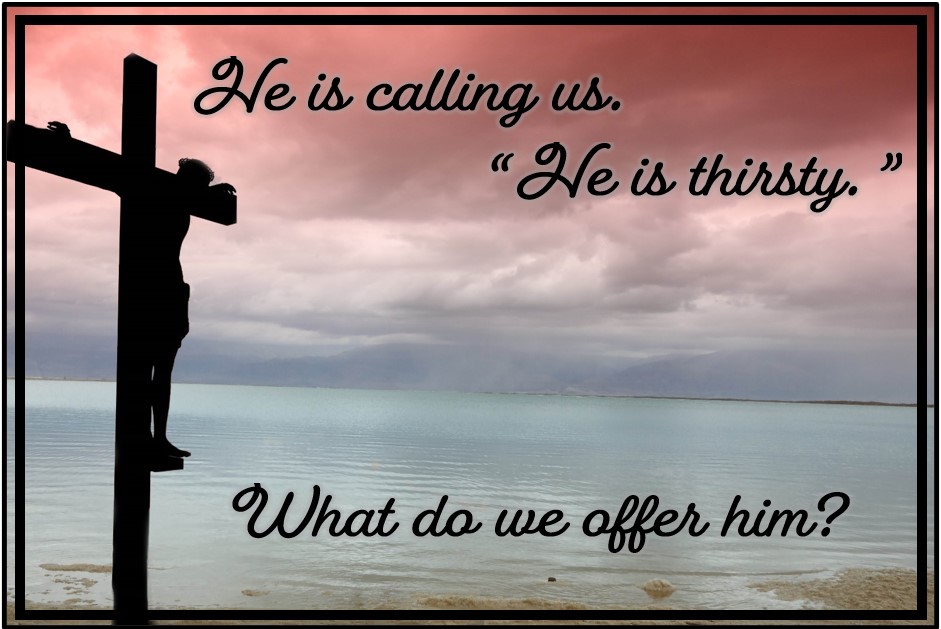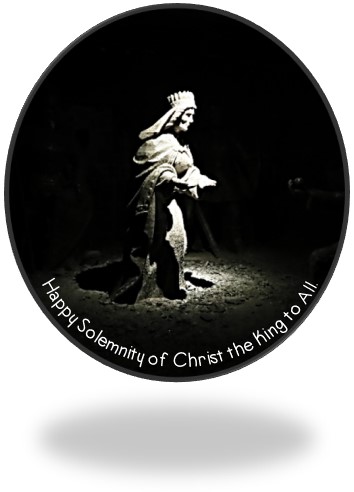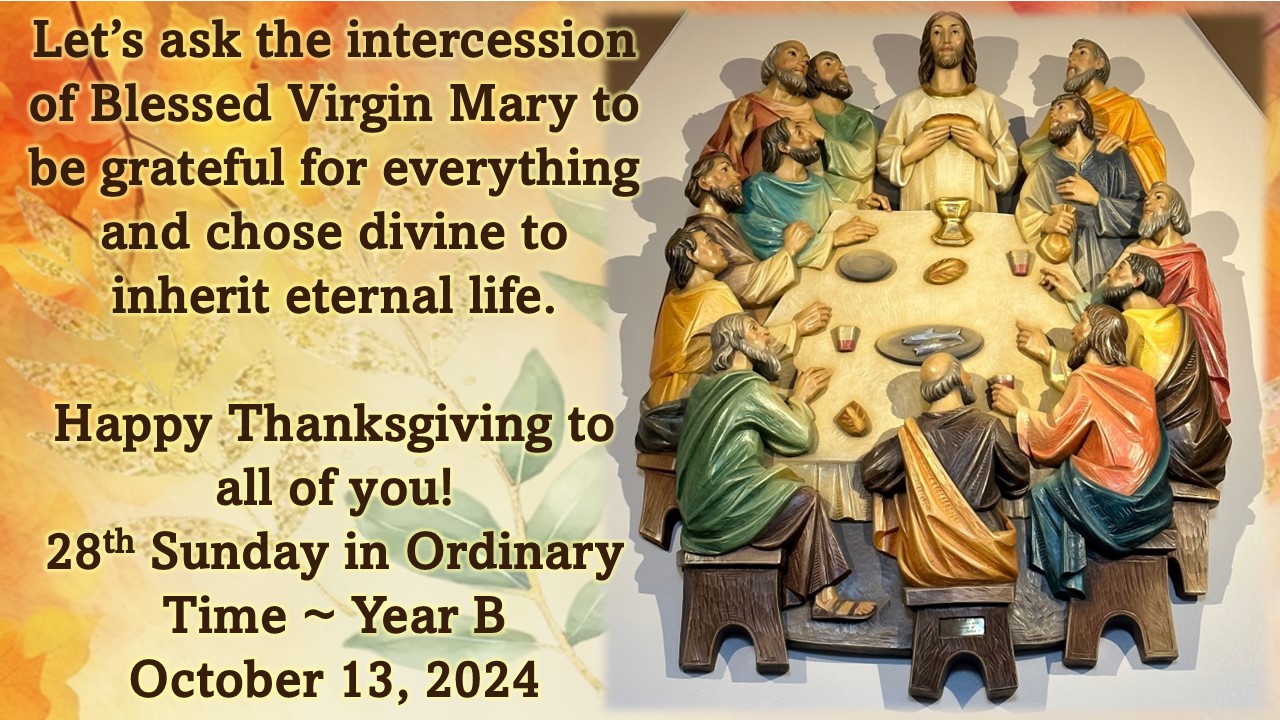
3rd Sunday of Lent Year A ~ March 12, 2023
HE IS THIRSTY
All living beings need water to quench their thirst and to grow. Water is life and without it, is death. However, when we reflect on the Word of the Lord, we come to know that water has become the symbol of eternal life. Let me share the following story to understand the title of my reflection “He is Thirsty”.
Once upon a time, in a city, a certain calf was born and a Rich Old Man bought the calf and being very fond of the gentle animal, named him ‘Delightful’. The Rich Old Man took good care of Delightful and fed him only the best. When Delightful grew up into a big fine strong bull, he thought, “I was brought up by this generous man. He gave me good food and constant care, even in times of difficulties. Now I am a big grown bull I would like to use my strength to give something in return to my Master”.
So Delightful said to the Rich Old Man, “Sir, please find some wealthy merchant who is proud of having many strong bulls. Challenge him by saying that your bull can pull one hundred heavily loaded bullock carts.” So, the next day, the Rich Old Man struck up a conversation with a proud merchant. In a while, he brought up the topic of who had the strongest bull in the city. The merchant said, “Many have bulls, but no one has any as strong as mine.”
The Rich Old Man said, “Sir, I have a bull who can pull one hundred heavily loaded bullock carts.”
“No friend, how can there be such a bull? That is unbelievable!” said the merchant. The other replied, “I do have such a bull, and I am willing to make a bet.” The merchant said, “I will bet a thousand gold coins that your bull cannot pull a hundred loaded bullock carts.” So, the bet was made, and they agreed on a date and time for the challenge.
On the day of the challenge, the proud merchant attached together one hundred big bullock carts. He filled them with sand and gravel to make them very heavy. The Rich Old Man fed the finest rice to the bull called Delightful. He bathed him and decorated him and hung a beautiful garland of flowers around his neck. Then he harnessed Delightful to the first cart and climbed up onto it.
Amidst his sudden popularity, the Rich Old Man could not resist the urge to make himself seem very important. So, he cracked a whip in the air, and yelled at the faithful bull, “Pull, you dumb animal! I command you to pull, you big dummy!”
The bull called Delightful thought, “This challenge was my ideal. I have never done anything bad to my master, and yet he insults me with such harsh words!” So Delightful remained in his place and refused to pull the carts. The proud merchant laughed and demanded his winnings from the bet. The Rich Old Man had to pay him the one thousand gold coins. He returned home and sat down, saddened by his loss.
Delightful grazed peacefully on his way home. When he arrived, he saw his Master sadly lying on his side. He asked, “Sir, why are you lying there like that? Are you fine?” The man said, I lost a thousand gold coins because of you. With such a loss, how could I be fine?” The bull replied. “Sir, you called me ‘dummy’. You even cracked a whip in the air over my head. In all my life, did I ever break anything, step on anything, make a mess in the wrong place, or behave like a ‘dummy’ in any way?”
Rich Old Man answered, “No, my pet.” Delightful said, “Then Sir, why did you call me ‘dumb animal’, and insulted me though I have done nothing wrong? But now I feel sorry for you, so please go again to the merchant, and make the same bet for two thousand gold coins. And remember to use only the respectful words.”
So, the Rich Old Man went back to the merchant and made the bet for two thousand gold coins. The proud merchant thought it would be easy money. Again, he set up the one hundred heavily loaded bullock carts. Again, the Rich Old Man fed and bathed the bull, and hung a garland of flowers around his neck. When all was ready, the rich man touched Delightful’s forehead with a lotus blossom, having given up the whip. Thinking of him as fondly as if he were his own child, he said, “My son, please do me the honor of pulling these one hundred bullock carts.”
Lo and behold, the wonderful bull pulled with all his might and dragged the heavy carts, until the last one stood in the place of the first. The merchant, with his mouth hanging open in disbelief, had to pay the two thousand gold coins. The onlookers were so impressed that they honored the bull called Delightful with gifts. But even more important to the Rich Old Man than his winnings, was his valuable lesson in humility and respect.
Isn’t it an amazing journey of Lent we have started by learning respect and accepting Jesus’ sacrifice with humility because He is thirsty for us? If we recall the readings of the previous Sundays, we can definitely find ourselves deep rooted in the spirit of Lent. On the First Sunday of Lent we reflected on the Temptation of Jesus and beginning of his public ministry which started with the words “He was led by the spirit to wilderness to be tempted”. And the Last Sunday’s Sacred Scripture invited us to open our hearts and minds to reflect and meditate on the great mystery of Jesus’ transfiguration. During that period of time, we contemplated also on the excitement of St. Peter who said “Lord, it is good to be here. If you wish I will build three dwellings….”. Isn’t encouraging that every day or every week we are able to be with the Lord during the celebration of the Holy Mass?
Today on this Third Sunday of Lent we are not only shown the disobedience of Israel who complained against Moses over the lack of water but also the disrespectful behavior towards Moses. In the First reading we see the people of Israel who are freed from the bondage of Egyptian slavery but now they want to go back to it as they are suffering with lack of water saying, “Why did you bring us out of Egypt, to kill us and our children and livestock with thirst”. Isn’t it strange behavior that we all have? The context of Psalm 95 is based on the First Reading to remind us not to harden our hearts but listen to the Lord.
He is thirsty for us even on the Cross because he loves us and wants us to come closer to him. The journey of Lent is all about the Holy Cross. We strongly believe that the Holy Cross is a source of our salvation and redemption because our Saviour died on the Cross to save and give us eternal life. St. Paul rightly says in the Second Reading “Since we are justified by faith, we have peace with God through our Lord Jesus Christ. Through whom we have obtained access to this grace in which we stand, and we boast in our hope of sharing the glory of God”.
St. Irenaeus says “From the beginning God created man out of his own generosity. He chose the patriarchs to give them salvation. He took his people in hand, teaching them, unteachable as they were, to follow him. He gave them prophets, accustoming man to bear his Spirit and to have communion with God on earth. He who stands in need of no one gave communion with himself to those who need him. Like an architect he outlined the plan of salvation to those who sought to please him. By his own hand he gave food in Egypt to those who did not see him. To those who were restless in the desert he gave a law perfectly suited to them. To those who entered the land of prosperity he gave a worthy inheritance. He killed the fatted calf for those who turned to him as Father, and clothed them with the finest garment. In so many ways he was training the human race to take part in the harmonious song of salvation.
For this reason, John in the book of Revelation says: His voice was like the voice of many waters. The Spirit of God is indeed a multitude of waters, for the Father is rich and great. As the Word passed among all these people, he provided help in generous measure for those who were obedient to him, by drawing up a law that was suitable and fitting for every circumstance. He established a law for the people governing the construction of the tabernacle and the building of the temple, the choice of Levites, the sacrifices, the offerings, the rites of purification and the rest of what belonged to worship.
He himself needs none of these things. He is always filled with all that is good. Even before Moses existed, he had within himself every fragrance of all that is pleasing. Yet he sought to teach his people, always ready though they were to return to their idols. Through many acts of indulgence, he tried to prepare them for perseverance in his service. He kept calling them to what was primary by means of what was secondary, that is, through foreshadowing to the reality, through things of time to the things of eternity, through things of the flesh to the things of the spirit, through earthly things to the heavenly things. As he said to Moses: You will fashion all things according to the pattern that you saw on the mountain. For forty days Moses was engaged in remembering the words of God, the heavenly patterns, the spiritual images, the foreshadowing of what was to come. Saint Paul says: They drank from the rock that followed them, and the rock was Christ. After speaking of the things that are in the law he continues: All these things happened to them as symbols: they were written to instruct us, on whom the end of the ages has come. Through foreshadowing of the future, they were learning reverence for God and perseverance in his service. The law was therefore a school of instruction for them, and a prophecy of what was to come”.
Once a man got lost in desert. Water in his flask had run out two days ago. He knew if soon he doesn’t find water, he will die surely. Just then he saw a small hut ahead. He thought it may be a hallucination, but he had no other option to move forward in the direction of hut.
As he got closer, he realized it was real. He reached the hut and when opening the door, he found out that hut was abandoned for a long time. He looked around with the hope to find water. He was surprised to see that, there was a water pump which had a pipe going down through the floor, perhaps deep to a source of water.
He began working the hand pump, but nothing happened. He kept pumping, but still no sign of water. Finally, he gave up from exhaustion and frustration. He felt that he is going to die but then just he noticed a bottle sitting in the corner of hut. It was filled with the water and corked up. Quickly he grabbed that bottle and was about to gulp down water, when he noticed a piece of paper attached to it. “Use this water to start the pump. Don’t forget to fill bottle again when you are done”. He found himself in a dilemma; if he followed the instructions and the hand pump didn’t work, he would die or should he trust that it would work? What if underground reservoir had long dried up? Even if the instruction were correct, should he risk it? If it turned out to be false then pouring that water into pump would be throwing away last source, he would have to save his life.
He closed his eyes, he said a prayer and then with trembling hands, he poured the water into pump and started working on the pump. A little while later, he heard a gurgling sound and then water came gushing out more than he could possibly use. He drank to his fill, got refreshed, and filled his flask and filled the bottle and corked it back up. After feeling much better, he looked around hut, he found a pencil and a map of region. Looking at the map, he realized that he was still far away from the nearest town but at least now he knew where he was and which direction to go. Before leaving the hut, he put the bottle in its place and added his own writing below the instruction: “Believe me, it works”.
Today’s Gospel has a similar story of a Samaritan woman who has come to the well to fetch the water. After her knowing of Jesus, she requests him “to give her the water, that she may never be thirsty again”.
St. Augustine reflecting on the Gospel says “A woman came. She is a symbol of the Church not yet made righteous but about to be made righteous. Righteousness follows from the conversation. She came in ignorance, she found Christ, and he began a conversation with her. Let us see what it is about, let us see why a Samaritan woman came to draw water. The Samaritans were not part of the Jewish people: they were foreigners. The fact that she came from a foreign people is part of the symbolic meaning, for she is a symbol of the Church. The Church was to come from the Gentiles, of a different race from the Jews. We must then recognize ourselves in her words, in her person, and with her give our own thanks to God. She was a symbol, not the reality; she foreshadowed the reality, and the reality came to be. She found faith in Christ, who was using her as a symbol to teach us what was to come. She came then to draw water. She had simply come to draw water, in the normal way of man or woman”.
He continues to say “Jesus says to her: Give me water to drink. For his disciples had gone to the city to buy food. The Samaritan woman therefore says to him: How is it that you, though a Jew, ask me for water to drink, though I am a Samaritan woman? For Jews have nothing to do with Samaritans. The Samaritans were foreigners; Jews never used their utensils. The woman was carrying a pail for drawing water. She was astonished that a Jew should ask her for a drink of water, a thing that Jews would not do. But the one who was asking for a drink of water was thirsting for her faith.
Listen now and learn who it is that asks for a drink. Jesus answered her and said: If you knew the gift of God, and who it is that is saying to you, “Give me a drink,” perhaps you might have asked him and he would have given you living water.
He asks for a drink, and he promises a drink. He is in need, as one hoping to receive, yet he is rich, as one about to satisfy the thirst of others. He says: If you knew the gift of God. The gift of God is the Holy Spirit. But he is still using veiled language as he speaks to the woman and gradually enters into her heart. Or is he already teaching her? What could be more gentle and kind than the encouragement he gives? If you knew the gift of God, and who it is that is saying to you, “Give me a drink,” perhaps you might ask, and he would give you living water. What is this water that he will give if not the water spoken of in Scripture: With you is the fountain of life? How can those feel thirst who will drink deeply from the abundance in your house?
This Sunday’s Gospel passage, the third of Lent, presents Jesus’ encounter with a Samaritan woman. He is on his way with his disciples, and they stop at a well in Samaria. The Samaritans were considered heretics by the Jews, and much despised, as second-class citizens. Jesus is tired, He is thirsty. A woman arrives to get water and He asks her, “Give me a drink”. Thus, breaking every barrier, He begins a dialogue in which He reveals to that woman the mystery of living water, that is, of the Holy Spirit, a gift from God. He was promising the Holy Spirit in satisfying abundance. She did not yet understand. In her failure to grasp his meaning, what was her reply? The woman says to him, Master, give me this drink, so that I may feel no thirst or come here to draw water. Her need forced her to this labor, her weakness shrank from it. If only she could hear those words: Come to me, all who labor and are burdened, and I will refresh you. Jesus was saying this to her, so that her labors might be at an end; but she was not yet able to understand.
Indeed, to the surprised reaction of the woman, Jesus responds, “If you knew God’s gift and who is the one who says to you, “Give me a drink!”, you would have asked him and He would give you living water”. He is the rock from where we get the water of eternal life. And the Apostle Paul interprets that rock as a symbol of Christ. He will say thus: “And the rock is Christ” (1 Cor 10: 4). He is the mysterious figure of his presence among the people of God on their journey. Those who thirst for salvation can draw freely from Jesus, and the Holy Spirit will become in him or in her a source of full and eternal life. The promise of the living water that Jesus made to the Samaritan woman became a reality in His Passion: “blood and water” came out of his pierced ribs (John 19:34). Christ, the lamb immolated and resurrected, is the source from which the Holy Spirit springs, who remits sins and regenerates to new life.
He is calling us “He is thirsty” and what do we offer him? Let us reflect and walk with Samaritan woman to who is begging Jesus to give her the water of eternal.
Other Sermons In This Series

Solemnity of Christ the King (34th Sunday) Year C ~ November 20, 2022
November 18, 2022

28TH SUNDAY IN ORDINARY TIME YEAR B ~ OCTOBER 13, 2024
October 10, 2024

7th Sunday in Ordinary Time Year A ~ February 19, 2023
February 17, 2023

